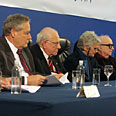
Israel, if not the Jewish State, is the largest or one of the two largest Jewish communities worldwide, and therefore what happens within it is highly relevant to the whole Jewish global collective. In this sense, the Winograd report is an enormously important document not only for Israeli society but also for contemporary Jewry. While it is not clear whether the immediate discussion about Israel’s government is over, the report opens wide and very problematic horizons to the Israeli, hence the world Jewish polity.
There can be little doubt that the Lebanon War weakened the world Jews’ identification with Israel. One reason is that historically, identification rises when Israel does well and wins, and diminishes when Israel does more poorly. Examples are provided by the levels of Jewish support in the 1967 Six Day War and in the 1973 Yom Kippur War. It was measurably higher in the former case, while the real risk was higher in the latter case. Moreover, the report unveils such a level of ineptitude by the Israeli civilian and military elites that the natural reaction may be to take distance from Israel.
This happens within a broader discussion, unrelated to the Lebanon war that is developing about the nature of Israel-Diaspora relations. The idea is diffusing that Israel not only is not central, but that it is not necessary, or even is a nuisance to the Jewish people. The important fact is not the idea itself, which misses the cardinal points of Israel’s existence and historical experience, but its being increasingly mentioned at the heart of Jewish establishment. Unless Israel radically corrects its ways, it can hardly pretend to centrality, or to be a light and source of inspiration within the Jewish collective, and its Jewish public support will unavoidably slide down.
On the positive side, it must be noted that Israel’s ability to express from its own midst a current of self critique is quite unique in international comparison, and is a factor that can strengthen outside support. No other country has been able to appoint such independent inquiry committees, and to submit itself to such high profile public critique, following political and military events that might have justified such interventions.
Real need of growing importance
Powerfully emerging in these moments of crisis and reflection is also the role that Jews out of Israel should take in shaping Israel’s policies and destiny. According to the President of the European Jewish Congress, Moshe Kantor, all people who are eligible for the Law of Return, Jews as non Jews, should vote on the future of Israel. Similarly, Ronald Lauder, President of the World Jewish Congress, advocates a Jewish people participation in any decisions concerning the future of Jerusalem.
These statements, while worth considering as a matter of broad principle, are very problematic because they come from leaders whose representation of any Jewish constituency ranges from unclear to unproven. We believe that a consultation between Israel and world Jewry on questions of common interest or on questions of mutual relations is a real need of growing importance. But if the issue is to be promoted, there is a need for appropriate and representative decision-making frameworks that today do not exist.
One promising process that was interrupted is the President’s Jewish Forum. That initiative should be restarted, and appropriate mechanisms should be studied to determine its goals, better structure, and mode of functioning. The Forum should be as representative as possible of the vast potentialities of the Jewish world, within but also significantly outside the existing institutions. Alongside, more specialized groups for Jewish strategic thinking and policy planning should be encouraged, including people from Israel and other countries.
There is no certainty, but at least the hope exists that if the appropriate channels for decision-making are in place and functioning, including regular consultation of Israel with the Jewish People, in the future we will need no more Winograd reports.
Professor Sergio DellaPergola holds the Shlomo Argov Chair on Israel Diaspora Relations at the Hebrew University of Jerusalem, and is a Senior Fellow at the Jewish People Policy Planning Institute















